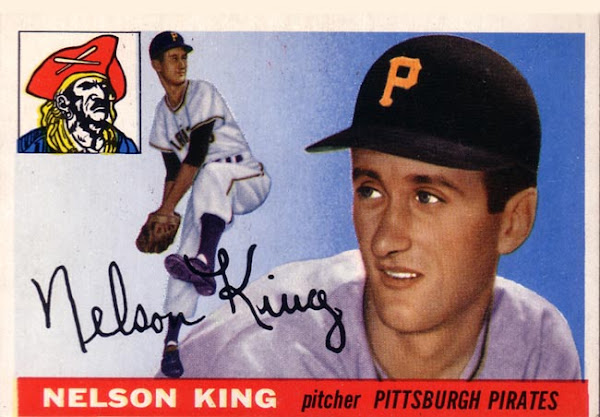Thursday, June 09, 2011
No royal treatment for King's family
By Gene Collier, Pittsburgh Post-Gazette
In this, the first full summer without being able to talk about life and baseball with her father, Amy King still moves confidently in that somehow hollowed out world.
It's a hurting place, an empty place, sometimes, but he has been gone since August and now again she thrives, more because of him than in spite of him.
"He was such a survivor," Nellie King's youngest daughter said over coffee Wednesday. "He always said, 'Make the best of whatever life gives you,' and he was the master of that. I know it's my destiny now to be the caretaker to my mother, but I just think, 'What would he do?' -- and that would be to say, 'OK, let's go, here's what has to be done.'
"It's been transformative."
For a time, Nellie King survived pneumonia, colon cancer and Parkinson's disease, all of which I guess wasn't terribly surprising from a guy who had survived traveling with the late Bob Prince.
But the timing of Nellie's Aug. 11, 2010, death was little short of a pity. It came eight months and 10 days before baseball commissioner Bud Selig stepped to a microphone in New York and announced a decades-overdue player benefit that substantially would have lightened the financial burden of those sickened final years for King, his seriously ill widow, and the three grown daughters whose hearts ached as they watched.
"Sometimes in life, it's just the right thing to do," Selig said that day in April. "I believe baseball is a social institution, and with that comes social responsibilities."
I believe he believes that, but baseball took forever to act on that belief, at least when it comes to players of King's era, players who never drew a pension even as the game's profit margins and salaries grew to obscene levels.
"It's better than nothing, but, in my estimation, it's a partial victory," said Doug Gladstone, whose book, "A Bitter Cup of Coffee" doubtless helped bring about the April announcement. "They announced with great fanfare that all these men who still are not vested, we're going to cut you checks for up to $10,000 for two years contingent upon your service. It's better than nothing, but it's not a real pension. It doesn't provide health-insurance coverage, nor will any player's spouse or loved one receive a designated benefit after the player passes.
"You can call it a guilt payment or reparations or what have you. But the foot-dragging for 31 years -- you didn't do anything about this? It's like telling the Nellie King family, look, he died at an inconvenient time for us. He should have stayed alive for this."
Gladstone there refers to 1980, when Major League Baseball was trying to steer away from a looming strike that would close the game for two months the following summer anyway. Baseball offered to lower the vesting requirement to 43 days for pensions and one game for health benefits. Prior to that, players were vested only after four years of service. King played parts of four seasons for the Pirates, but did not qualify. Some 900 players were in the same abandoned boat. The union happily accepted the new pension requirement when the 1981 strike ended, but no one on either side, not before or since (until April), had the courage or the political skill to make the benefits retroactive.
"Here's Major League Baseball, with all these guys making all these big salaries -- you know they could have paid it," Amy said without anger. "That's a leadership issue. More practically, it's a health-care issue. Most of those guys had families."
Players in King's situation brought suit against baseball in 2004 and lost, and Selig was quick to point out in this go-around that baseball was under no legal obligation to pay these guys anything.
It's puzzling because baseball has for some time now made good faith attempts to be magnanimous with former players, even to the extent of providing benefits for veterans of the Negro Leagues, none of whom Major League Baseball even employed.
Modern players don't have to worry. They're vested just about as soon as they show up.
"My position is, in all my travels, I get the sense that the union didn't tell contemporary players about these guys. Either [former MLPA chief Donald] Fehr and [Marvin] Miller [Fehr's predecessor] didn't tell them, or they told them and they don't care. Players like Nellie King helped grow the game. They allowed these salaries to occur."
The mid-'50s Pirates teams for whom King pitched would seem almost like an historical abstraction for someone like Amy King, except that her father was always so much a part of the Pirates family.
"He was so proud of that," she said, "even knowing all this stuff. He was one of the most cherished members of the Pirates Alumni. I mean, they fired the man [along with Prince from the broadcast crew in 1975], but he always loved them. You can't beat the loyalty out of some people."
Uh-huh. And, when you talk with Amy King, you realize you can't beat the dignity out of some, either.
